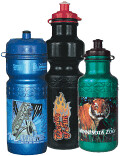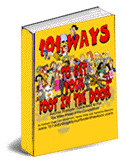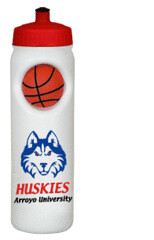Credit and Collections
A friend of mine had this to say: To a salesman, a sale takes place when the customer says they think they want to buy. The sales manager wants to see an actual purchase order. The Vice President only believes it when it ships. The President only takes notice when its paid for. The controller finally joins the party when the check clears.
I was talking to a collection guy the other day who wanted to help me collect my past due accounts. We both agreed that my customers, those who sell end users, probably have a bigger collection problem than the suppliers do. If Bob's Muffler and Body Paint doesn't need more imprinted hats (or water bottles), he might be inclined to pay his other suppliers first when money is tight.
So, how does one make sure they get paid. I'll throw out a few ideas today, and save a few for another day. (Tricky way to get you to come visit me again.)
1. Never ship the first order on open account. (Occasional exceptions allowed, but rare.)
2. Get FIVE credit references. Everybody keeps three good ones no matter how bad they pay.
3. Ask for a personal guarantee. You need home address and phone number. Try for the SS#.
4. Send a friendly fax reminder two days before the invoice is due. Call 5 days after it is due. Always say that you just want to be sure that they received the product and that everything was satisfactory, or that you wanted to be sure they received the invoice. Don't use any "collection" attitudes until about the 3rd call.
5. Have available and offer Credit Card payments.
6. Offer a strong discount for early payments. The earlier you collect an invoice the more likely you are to get paid. I know that is sort of like saying you always find something the last place you look. It is obvious, but it is a critical collection rule.
If you do all of the above, I assure you that you only have rare collection losses. But as promised, I will offer another list on another day. Oh, for those of you in sales. This matters to you. If your company doesn't collect, they may not be able to pay you. The best sales people are also the front line of good credit practices.
I was talking to a collection guy the other day who wanted to help me collect my past due accounts. We both agreed that my customers, those who sell end users, probably have a bigger collection problem than the suppliers do. If Bob's Muffler and Body Paint doesn't need more imprinted hats (or water bottles), he might be inclined to pay his other suppliers first when money is tight.
So, how does one make sure they get paid. I'll throw out a few ideas today, and save a few for another day. (Tricky way to get you to come visit me again.)
1. Never ship the first order on open account. (Occasional exceptions allowed, but rare.)
2. Get FIVE credit references. Everybody keeps three good ones no matter how bad they pay.
3. Ask for a personal guarantee. You need home address and phone number. Try for the SS#.
4. Send a friendly fax reminder two days before the invoice is due. Call 5 days after it is due. Always say that you just want to be sure that they received the product and that everything was satisfactory, or that you wanted to be sure they received the invoice. Don't use any "collection" attitudes until about the 3rd call.
5. Have available and offer Credit Card payments.
6. Offer a strong discount for early payments. The earlier you collect an invoice the more likely you are to get paid. I know that is sort of like saying you always find something the last place you look. It is obvious, but it is a critical collection rule.
If you do all of the above, I assure you that you only have rare collection losses. But as promised, I will offer another list on another day. Oh, for those of you in sales. This matters to you. If your company doesn't collect, they may not be able to pay you. The best sales people are also the front line of good credit practices.




